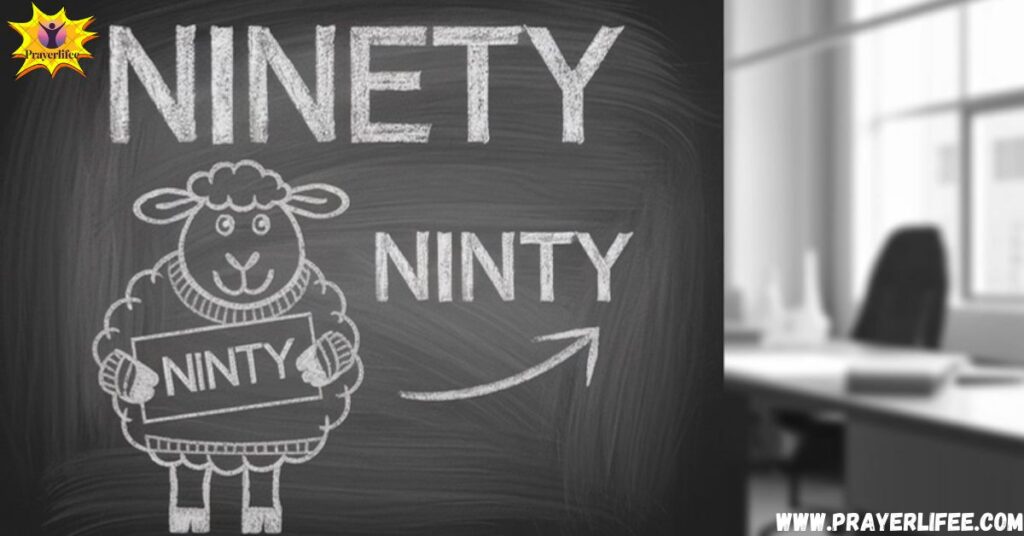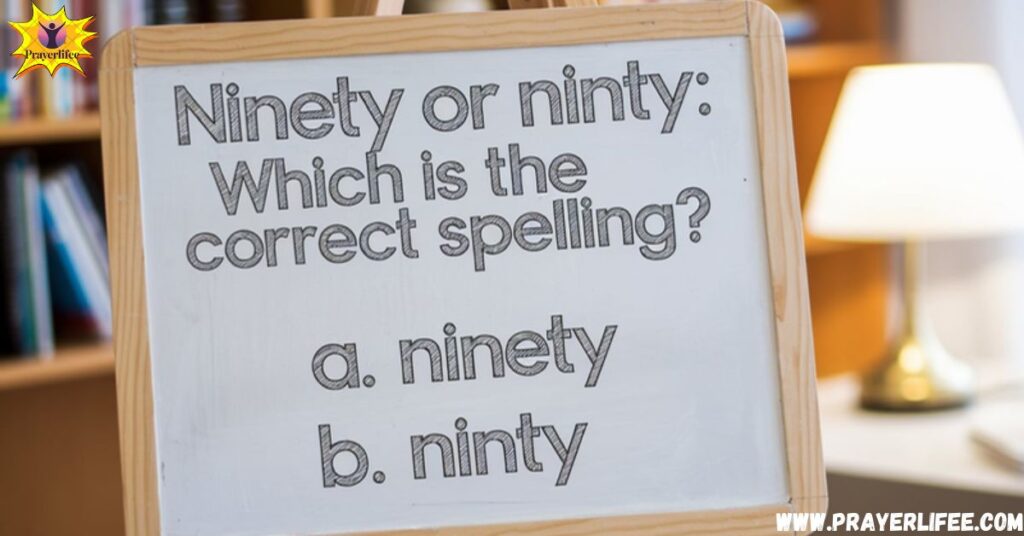When it comes to writing the number 90 in words, you may wonder whether it should be ninety or ninty. The correct spelling is ninety, but many people mistakenly use ninty due to how the word sounds. This common error can lead to confusion in both casual and professional writing.
You’ve probably seen “ninty” used before, but what’s the real difference between the two? It’s more than just a typo—it’s a spelling rule that can affect your writing. Let’s explore why ninety is the right choice and why ninty is wrong.
Ninety comes from Old English, and it’s the standard spelling for the number 90. The confusion arises because the pronunciation of “ninety” makes it sound like it could end in “y.” However, following the right spelling rules is important for clarity and professionalism in writing.
Why It’s “Ninety” and Not “Ninty”

The word ninety is the correct spelling, and it’s rooted in Old English. Over time, the word has evolved, but it has kept its original structure. On the other hand, “ninty” is an incorrect spelling that is widely used by mistake, often because the word “ninety” sounds like it should not have the final “e.” This phonetic confusion is understandable but doesn’t align with English grammar rules for spelling numbers.
Understanding the right spelling of numbers is important because it maintains language consistency. Using the incorrect form, such as “ninty,” could harm the clarity of your writing, especially in professional or formal settings. For instance, in a business report or an email, even small writing errors like this can make your work appear less polished and can lead to confusion. Correct spelling usage, such as “ninety,” is crucial for professionalism and writing clarity.
Understanding the Origin of “Ninety”
The confusion over “ninety” and “ninty” likely stems from its roots in Old English. The number 90 comes from the Old English word “nigontig,” which combines nigon (meaning “nine”) and tig (meaning “ten”). Over time, the word evolved into the modern ninety, which adheres to the rules of number spelling in English. These rules dictate that the “e” is preserved in the spelling of “ninety” to maintain its consistency and proper pronunciation.
Interestingly, similar changes occurred in other number words in Old English. For example, “twenty” comes from “twentig,” “thirty” from “þrītig,” and “forty” from “fēowertig.” All of these numbers keep their endings consistent, and “ninety” is no exception. Understanding the old English number origins can help you grasp why “ninety” is the correct form and why “ninty” doesn’t fit.
Why Spelling Accuracy Matters
Spelling accuracy is essential in all forms of writing. Whether you are composing a professional email, a report, or a casual text message, correct spelling usage helps you communicate more effectively and ensures your message isn’t lost or misunderstood. For example, misspelling “ninety” as “ninty” in a formal email can make your writing seem careless or unprofessional. If you’re in the business world, even small spelling mistakes in writing can have a negative impact on how others perceive your attention to detail.
Moreover, clarity in communication is key. Mispronunciations and misspellings like “ninty” can cause confusion, especially when precision is important. Consider a situation in which a financial report lists an amount as “ninty thousand dollars.” The reader might pause to question whether this is a typo or if the writer lacks attention to detail. That slight moment of confusion could detract from the message you’re trying to convey.
The Common Confusion: Why People Write “Ninty”
The most common reason people write “ninty” instead of “ninety” is due to how the word sounds. The silent “e” in spelling often gets dropped in speech, making “ninety” sound like “ninty.” This is particularly noticeable in rapid or casual speech, where the final “e” is barely articulated. As a result, many people believe the correct spelling should reflect how the word is pronounced, leading them to drop the “e” entirely.
In English, phonetic spellings often guide how people write words. However, English is a language with many exceptions, especially in numbers. For example, the word “nine” keeps its “e” at the end when combined with “ty,” resulting in “ninety,” not “ninty.” It’s important to recognize that spelling rules, especially for numbers, don’t always follow the sounds of the word. Keeping track of number spelling rules can help prevent mistakes like this.
Practical Tips to Avoid Writing “Ninty”

To avoid writing “ninty” in the future, here are some practical tips:
1. Mnemonics for Memory
One helpful way to remember the correct spelling of “ninety” is to use a mnemonic. For example, think of it like this: “Nine plus ty equals ninety.” This simple rhyme reinforces the connection between the word “nine” and the ending “ty.”
2. Leverage Technology
Using spelling correction tools like Grammarly or built-in spell checkers in word processors can help you quickly identify and correct spelling mistakes, including the misspelling of “ninety.” These tools are especially useful for proofreading techniques that help catch errors before finalizing your writing.
3. Proofread Aloud
Proofreading aloud is another technique that can help you spot errors you might miss when reading silently. When you read out loud, you may notice that “ninty” just doesn’t sound right, helping you to fix the mistake before sending or publishing your work.
4. Practice Writing
Finally, practice writing “ninety” correctly in different contexts, whether in emails, reports, or casual messages. Familiarizing yourself with the word in various writing scenarios can help solidify the correct spelling in your memory.
The Impact of Misspellings in Real Life
Even though spelling might seem like a small detail, misspellings like “ninty” can cause significant confusion in both professional and casual contexts. For instance, imagine a scenario where you’re working on a project proposal and accidentally write “ninty thousand dollars” instead of “ninety thousand dollars.” A potential client may focus more on the misspelling than the actual content, leading to a loss of credibility. This is why professionalism in writing is so important.
In both formal and informal settings, consistent and correct spelling maintains clarity. In professional writing, using the correct spelling of numbers ensures that your documents appear polished and trustworthy. Even in casual writing, text message spelling errors can make communication harder to understand, causing unnecessary back-and-forth to clarify what you meant.
Formal/Precise vs. Casual Writing

Whether you are writing formally or informally, it’s essential to maintain language accuracy in your spelling. In formal writing, such as reports or business communications, consistent and correct spelling shows that you value professionalism. On the other hand, casual writing, such as texting or chatting in a group, still benefits from correct spelling. Even in relaxed settings, writing mistakes and solutions like using “ninty” can lead to confusion and disrupt the flow of communication.
Practical Applications of “Ninety”
Understanding how to write ninety correctly can help you in many real-world situations. For instance, in business, you might write something like: “The total cost is ninety dollars.” This usage demonstrates professionalism in pricing. In other cases, such as in legal contracts or financial reports, using numbers in word form like “ninety” instead of “ninty” is vital for clarity and precision.
Using correct spelling also extends beyond just the number itself. When writing formal documents, it’s helpful to use both numerals and words to make things clear. For example, “The project is estimated to cost $90 (ninety dollars).” This helps prevent any ambiguity.
Commonly Misspelled Words and Their Causes
It’s not just “ninety” that people misspell. Other words, especially numbers, are often written incorrectly. For example, “forty” is frequently misspelled as “fortyty,” and “thirty” is sometimes written as “threty.” These mistakes happen due to misunderstanding of spelling rules and mispronunciations. Below is a table of common spelling errors:
Ninty or Ninety: Which Is Correct?
When you’re writing the number 90 in words, you may be wondering, “Is it ninty or ninety?” The correct spelling is ninety. Despite how it sounds, especially when spoken quickly or casually, ninety is the right choice. “Ninty” is a common misspelling that occurs due to phonetic confusion, where the word’s sound leads people to believe it should lack the final “e.” However, if you want your writing to reflect proper language accuracy and adhere to spelling rules, ninety is the form you should use every time.
The confusion likely arises from the way “ninety” is pronounced. When spoken aloud, the “e” at the end of “ninety” is barely noticeable, which might tempt you to write it as “ninty.” However, correct spelling usage requires you to stick to the standard form: ninety. Using the incorrect form, “ninty,” can impact the clarity of communication and reflect poorly on your attention to detail, especially in professional or formal writing contexts. Whether you are drafting an email, preparing a report, or just texting a friend, writing “ninety” is the way to go.
Trick to Remembering Which One to Use
If you have trouble remembering whether it’s “ninty” or “ninety,” there’s a simple trick that can help. Think of the word “nine” and the suffix “ty.” Since “nine” ends with an “e,” it makes sense that the number 90 would follow suit. So, whenever you write out the number 90, remind yourself: “Nine plus ty equals ninety.” This simple phrase can help solidify the correct spelling in your memory, and once you get the hang of it, you’ll rarely make the mistake of writing “ninty.”
Another good memory aid is the fact that ninety has been the standard spelling for centuries. It’s rooted in Old English, where it came from the word “nigontig,” which was a combination of “nine” and “tig,” meaning “ten.” The “e” at the end has been consistent in both pronunciation and spelling since its origins, and following this long-standing pattern will ensure your spelling is correct.
Ninety vs. Ninetieth: What’s the Difference?
The difference between “ninety” and “ninetieth” lies in their use and meaning. Ninety refers specifically to the number 90, which you use when you are describing the quantity of something. For example, “I have ninety dollars” or “She is ninety years old.” It is simply the word form of the number 90.
On the other hand, ninetieth is an ordinal number, meaning it refers to the position in a sequence. For example, “This is my ninetieth birthday” or “He finished in ninetieth place.” Ordinal numbers like ninetieth are used to indicate order or rank, while cardinal numbers like ninety are used to describe a quantity. So, while both words are related to the number 90, ninety is used for counting, and ninetieth is used for positioning.
In conclusion, always use “ninety” when referring to the number itself and “ninetieth” when talking about a position in a sequence. Understanding the difference between these two forms is key to clear and accurate writing. And, as mentioned earlier, sticking to ninety instead of “ninty” ensures your writing maintains the necessary language consistency and avoids any confusion.
| Misspelled Word | Correct Word | Why It Happens |
| Ninty | Ninety | Phonetic confusion |
| Fortyty | Forty | Adding a redundant suffix “-ty” |
| Threty | Thirty | Misunderstanding of spelling rules |
Final Thoughts on “Ninety or Ninty”
In conclusion, the correct spelling is ninety, not ninty. Understanding the origin of the word, recognizing the causes of misspellings, and applying helpful tips like mnemonics and proofreading can help you write confidently and accurately. Whether you’re writing a professional email or sending a casual text message, paying attention to the spelling of numbers ensures that your communication is clear and polished. Always remember, ninety is the only correct way to spell the number, and it’s worth taking the time to get it right.

